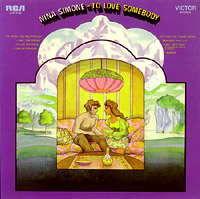Tracks
"Revolution" is the only original song written for the album. It was Simone's third subsequent single released in the UK after "Ain't Got No, I Got Life" and "To Love Somebody" both became hits. The song was released around the time of the same titled song by the Beatles and, although it has a similar hook ("Don't you know it's gonna be – all right") and structure, most of the lyrics differ. The song also uses a guitar lick similar to "Old Brown Shoe," which had been recorded by the Beatles the same year. John Lennon commented on the similarities in a 1971 interview with Rolling Stone :
I thought it was interesting that Nina Simone did a sort of answer to "Revolution." That was very good–it was sort of like "Revolution," but not quite. That I sort of enjoyed, somebody who reacted immediately to what I had said. [2]
The song is split into two parts as a result of the single release. "Revolution" didn't do well in the UK charts, and only had a mild success in the United States R&B charts. Simone was surprised by this and said to Sylvia Hampton, author of the biography Break Down and Let It All Out about this:
I don't get it. It's about a revolution, man: not just colour, but everything! It's about barriers being broken down, and they sure as hell need getting rid of. [...] We need a revolution to sort it all out and get back to God. You know how lost we are, man – it's sad. [3]
Simone also recorded an alternate version of "Turn! Turn! Turn!" that was (previously) unreleased.
This page is based on this
Wikipedia article Text is available under the
CC BY-SA 4.0 license; additional terms may apply.
Images, videos and audio are available under their respective licenses.
